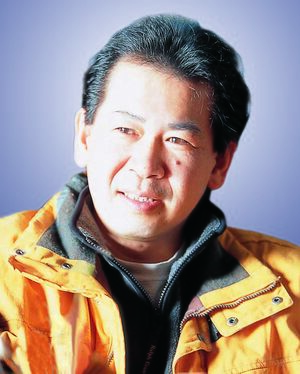Difference between revisions of "Yu Suzuki"
From Sega Retro
Scarred Sun (talk | contribs) m (25 revisions) |
Scarred Sun (talk | contribs) |
||
| Line 1: | Line 1: | ||
[[Image:Yu Suzuki.jpg|frameless|right]] | [[Image:Yu Suzuki.jpg|frameless|right]] | ||
| − | '''Yu Suzuki''',[[AM2]]'s star developer, is one of the most highly-regarded visionaries in the industry. He joined [[Sega]] in 1983 as a programmer and producer, and two years later he created ''Hang-On'', the first simulation arcade game. ''Hang-On'' was also the first arcade racing game to feature a fully interactive cabinet, with the player sitting on and controlling a replica motorcycle. | + | '''Yu Suzuki''', [[AM2]]'s star developer, is one of the most highly-regarded visionaries in the industry. He joined [[Sega]] in 1983 as a programmer and producer, and two years later he created ''Hang-On'', the first simulation arcade game. ''Hang-On'' was also the first arcade racing game to feature a fully interactive cabinet, with the player sitting on and controlling a replica motorcycle. |
Suzuki has always tried to push the limits of arcade hardware and was the first to develop a title using the cutting-edge Model 1 arcade board. With the Model 1, Suzuki began his first foray into the world of polygons, and the result was ''Virtua Racing''. This F1 racing simulator was completely rendered in 3D, and allowed players to experience the action from four different camera angles. | Suzuki has always tried to push the limits of arcade hardware and was the first to develop a title using the cutting-edge Model 1 arcade board. With the Model 1, Suzuki began his first foray into the world of polygons, and the result was ''Virtua Racing''. This F1 racing simulator was completely rendered in 3D, and allowed players to experience the action from four different camera angles. | ||
| Line 50: | Line 50: | ||
* ''Sega RaceTV'' (2008) — Director | * ''Sega RaceTV'' (2008) — Director | ||
| − | [[Category:Developers]] | + | [[Category:Sega AM2 Developers]] |
Revision as of 14:56, 7 March 2010
Yu Suzuki, AM2's star developer, is one of the most highly-regarded visionaries in the industry. He joined Sega in 1983 as a programmer and producer, and two years later he created Hang-On, the first simulation arcade game. Hang-On was also the first arcade racing game to feature a fully interactive cabinet, with the player sitting on and controlling a replica motorcycle.
Suzuki has always tried to push the limits of arcade hardware and was the first to develop a title using the cutting-edge Model 1 arcade board. With the Model 1, Suzuki began his first foray into the world of polygons, and the result was Virtua Racing. This F1 racing simulator was completely rendered in 3D, and allowed players to experience the action from four different camera angles.
In 1993, Suzuki's next Model 1 masterpiece was the acclaimed Virtua Fighter. It was the very first 3D fighting game, and featured what is considered to be one of the deepest fighting engines ever. Virtua Fighter’s impact was such that it is housed in the Smithsonian Institution's Permanent Research Collection on Information Technology Innovation.
In 1999, Yu Suzuki released Shenmue, his first title for a home console. Five years in the making, Shenmue features a sweeping story, multiple gameplay elements, and an unprecedented level of detail. Shenmue also marks the start of a new genre, dubbed by Suzuki as FREE, or Full Reactive Eyes Entertainment. The story, graphics, and the innovative system exceeded those of many previous games.
Shenmue is currently the second most expensive game to be developed (being recently surpassed by Grand Theft Auto IV, which cost roughly 100 Million USD.) with the whole project costing 70 million USD.
In 2003, Suzuki became the sixth person to be inducted into the Academy of Interactive Arts and Sciences' Hall of Fame. On April 1, 2009, Suzuki retired from Sega.
Production History
- Space Harrier (1985) — Producer, Director
- Hang-On (1985) — Producer, Director
- Out Run (1986) — Producer, Director
- Super Hang-On (1986) — Producer
- After Burner II (1986) — Producer, Director
- Power Drift (1988) — Producer, Director
- Turbo Outrun (1989) — Producer, Director
- Virtua Racing (1992) — Producer, Director
- Virtua Fighter (1993) — Producer, Director
- Virtua Fighter (Saturn Version) (1994) — Producer
- Virtua Cop (1994) — Supervisor
- Virtua Cop (Saturn Version) (1994) — Supervisor
- Virtua Fighter (32X Version) (1995) — Special Thanks
- Virtua Fighter 2 (1995) — Producer, Director
- Virtua Fighter 2 (Saturn Version) (1995) — Producer
- Virtua Fighter 2 (PC Version) (1995) — Supervisor
- Fighting Vipers (Saturn Version) (1995) — Producer
- Virtua Cop 2 (1995) — Producer
- Virtua Cop 2 (Saturn Version) (1996) — Producer
- Sonic the Fighters (1996) — Producer
- Virtua Fighter 3 (1996) — Producer
- Fighters Megamix (1996) — Producer
- Virtua Cop (PC Version) (1997) — Supervisor
- Virtua Cop 2 (PC Version) (1997) — Supervisor
- Virtua Fighter 3: Team Battle (1998) — Producer
- Ferrari F355 Challenge (1999) — Producer, Director
- Shenmue (1999) — Producer, Director, Game Story
- Shenmue II (2001) — Producer, Director, Game Story
- Propeller Arena (2001) — Producer
- Virtua Fighter 4 (2001) — Producer
- Shenmue II (Xbox Version) (2002) — Producer, Director
- Virtua Fighter 4: Evolution (2002) — Producer
- Virtua Fighter 4: Evolution (PS2 Version) (2003) — Executive Director
- Virtua Fighter 4: Final Tuned (2003) — Producer
- Out Run 2 (2003) — Producer
- Sega RaceTV (2008) — Director
